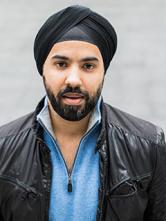AUTHOR SPOTLIGHT: Arjun Singh Sethi
From bullying and intimidation to violence and murder, the number of hate crimes has only escalated since Trump’s presidential campaign and ultimate win in 2016. In American Hate, a collection of gripping testimonials, community activist and civil rights lawyer Arjun Singh Sethi documents the stories of people who have been the targets of those hate crimes—and how they’re fighting back.
We sat down with Sethi to learn more about the profiles in the book and discuss his travels across the country holding community forums about hate crimes and resistance. You can learn more about these community conversations via Sethi’s Instagram account, @survivorsspeakout.
AS: The survivors I met shared a near uniform belief that though hate preexisted Trump and will endure after him, Trump has nevertheless emboldened hate across this country. There is something really pernicious about a candidate seeking the highest office in the land using his rank, privilege, and power to target others. Now that Trump is president, he has exercised the worst form of bully pulpit. We must call Trump what he is: a racist and sexist, whose ideologies are white supremacy and greed. He must be taken to task for his rhetoric and policies.
The statistics for hate crimes are notoriously unreliable. Why is that the case and how can this be improved?
AS: The FBI releases data on the number of hate crimes committed every year, but they rely on voluntary reporting by local law enforcement not mandatory reporting. The vast majority of police departments don’t bother to report, and those that do often erroneously report zero hate crimes. For example, Khalid Jabara was shot and killed by his racist neighbor, and the Tulsa police department didn’t include his murder in their 2016 annual report to the FBI. The gaps in reporting are gargantuan. The FBI reported roughly 6,000 hate crimes in 2016, but the National Crime Victimization Survey pegs the annual number of hate crimes closer to 250,000 a year.
Hate crime reporting should be mandatory not voluntary, and police departments that fail to report should be held accountable. Community organizations that collect this data through their own databases should also receive community and philanthropic support to continue this important work.
You have been traveling across the country, talking about the book. What has the response been?
AS: When I took to the road last year, I expected to find pain and grief, and I did. There are so many who have been targeted by state and hate violence and lost so much. But I also found that survivors remain resilient, optimistic, and dedicated to rebuilding their lives and supporting their communities. I’ve been holding community conversations across the country that feature many of the survivors in the book as well as local activists. Survivors have given updates about their cases, and previously anonymous survivors have come forward and recounted their own stories of hate and bigotry in Trump’s America. These forums have spurred important conversations about accountability, healing, and best practices to address hate violence. I continue to be struck by the amazing work that survivors and community organizations do every day.
While your book certainly does speak to this relationship between the election of Trump and the rise in hate, it also reverses this narrative by discussing how everyday people across the country have mobilized against hate in the wake of Trump’s election. Can you talk more about this mass mobilization against hate since the election?
AS: People are mobilizing in every way imaginable against the cruel and inhumane policies of this administration. There have been countless vigils, community conversations, know-your-rights presentations, teach-ins, and rallies on issues ranging from Muslim rights, refugee rights, and police brutality to affordable health care, access to abortion, and climate change. Activists and impacted communities are building stronger, more diverse coalitions as well, without flattening the diversity of experience within their communities. Japanese Americans have stood with Muslims and refugees to condemn the travel bans. Native communities have worked closely with Latinx communities to oppose the southern border wall.
The #MeToo movement has drawn an important spotlight on the everyday sexism, misogyny, and harassment that women endure. Lawyers have played an important role too and helped strike down some of this administration’s cruelest policies. Finally, survivors themselves, who had every reason to turn their back on this country, are organizing, mobilizing, and advocating. We should follow their example.


